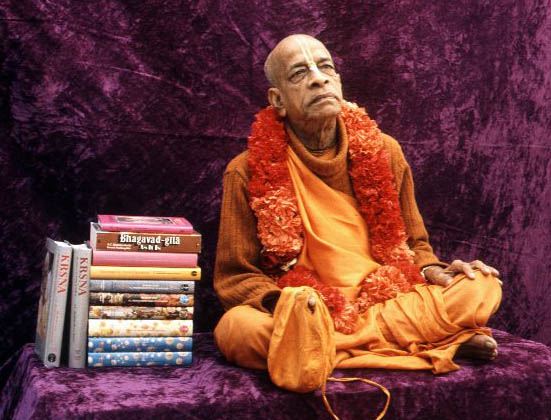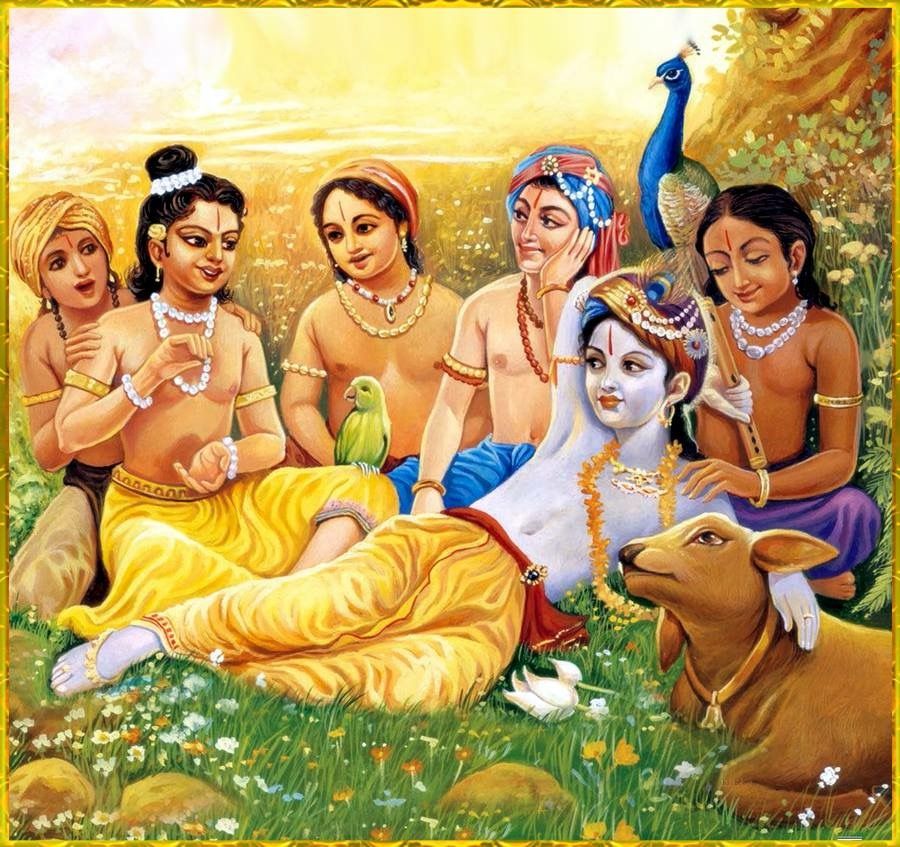

Śrīmad-Bhāgavatam 1.10.4
London, November 25, 1973
Pradyumna: (leads chanting, etc.)
kāmaṁ vavarṣa parjanyaḥ
sarva–kāma–dughā mahī
siṣicuḥ sma vrajān gāvaḥ
payasodhasvatīr mudā[SB 1.10.4]
Translation: “During the reign of Mahārāja Yudhiṣṭhira, the clouds showered all the water that people needed, and the earth produced all the necessities of man in profusion. Due to its fatty milk bag and cheerful attitude, the cow used to moisten the grazing ground with milk.”
Prabhupāda: (…) Now, here it is stated, siṣicuḥ sma vrajān gāvaḥ [SB 1.10.4]. Now, we are hankering after milk, but in those days, during Mahārāja Yudhiṣṭhira’s time, milk was so sufficiently produced that before milking the cow, it supplied milk so sufficiently that the… What is called? Grazing ground? Pasturing ground, they become muddy. They become muddy with milk. Now, with the scarcity of grain, the earth also does not become muddy. It becomes dry earth. But in those days, with milk it was muddy. Just imagine how much milk was… And how it is possible? Siṣicuḥ sma vrajān gāvaḥ payasodhasvatīr mudā [SB 1.10.4]. The milk bag was so fatty and full with milk. Why? mudā, they were so happy. They were so happy. So if you keep the cows happy, then cow will supply large quantity of milk. If the cow knows that you are going to kill it, she is always afraid, always fearful: “Oh, this man will kill.” They can understand. I have seen in New Vrindaban. One cow, she was crying because her calf was taken away. So she was feeling so sorry. Now in our New Vrindaban, we see how the cows are happy, how they are dealing. They are not afraid. This is our duty, to keep the cows happy. Just like I want to see my wife and children happy, similarly, it is the duty of the human society to see that the cows feeling very happy. This is human civilization. Otherwise it is tiger civilization, meat-eaters. Meat is not eaten by human being. It is eaten by the dogs, by the tigers, by the animals.
So we have created a society for killing cows and eating the meat and maintaining slaughterhouse in the name of religion. This is going on. So how we can be happy? There cannot be happiness. It is not a sentiment. Therefore this is most sinful activity, meat-eating, cow killing. Most sinful activity. And you have to suffer for that. Unfortunately, these rascals, they do not know that what is the result of this sinful activity. They think the life will go on, and there is no more life. “After finishing of this body, everything will be finished.” Atheistic theory. Bhasmī–bhūtasya dehasya kutaḥ punar āgamano bhavet. Kutaḥ. “Oh, who is coming?” But that they do not know, rascals. We get information from Kṛṣṇa, tathā dehāntara–prāptiḥ: [Bg. 2.13] “Oh, you have to accept another body after finishing this body.” But they are not responsible. They are so irresponsible, they do not care for the next life, the result of pious and sinful activities.
So it appears that how much strictly the cow protection was there so that the gāvaḥ, payasodhasvatīr mudā. They were… You’ll see Kṛṣṇa. He is always with cows, and how the cows look very happy with Kṛṣṇa. And Kṛṣṇa is personally teaching how to protect cows. He became a cowherd boy. He was king’s son, Mahārāja Nanda; but His business was to take the cows and the calves daily to the pasturing ground. And it was very sportive engagement with the cowherd boys. The cows were grazing, and the boys, they took their meals in a pot, tiffin carrier. Not tiffin carrier in those days. Some way or other. And they used to eat them, distribute amongst the friends. Sometimes a tiffin carrier was stolen by one boy, and he was searching, and then it was… So just like the boys do. This was the children’s life, to take protection, to give protection to the cows, to the calves. The small children, up to six years, seven years old, they used to take care of the calves, and the elderly men, the used to take care of the… Or elderly boys, they used to take care of the grown-up cows. So the cows were fed very nicely. Vrajān. Therefore Vṛndāvana is called Vrajabhūmi, “where there are many cows.” It is called Gokula. Gokula. Go means cows, and kula means group. Gokula. Govardhana. Govardhana Hill. Because the cows were grazing on the hill, and profuse grass was being grown, and they are enjoying. So there should be arrangement. Just like here we see, there are so many open fields and the cows are grazing. But they cannot be happy because they know that they are simply raised for being killed. They cannot be happy.
So our Kṛṣṇa consciousness movement is not a sentimental movement. It takes care of all-found social organization. It is not something like religious sentiment. Everything should be take care of. Therefore we say cow protection, cow protection. Here it is said, kāmaṁ vavarṣa parjanyaḥ sarva–kāma–dughā mahī [SB 1.10.4]. Mahī means land, bhūmi. Agnir mahī gaganam ambu marud-diśaḥ… Mahī. This is mahī. In another, Brahma–saṁhitā, it is said, mahī.
agnir mahī gaganam ambu marud-diśaś ca
kālas tathātma-manasīti jagat-trayāṇi
yasmād bhavanti vibhavanti viśanti yaṁ ca
govindam ādi–puruṣaṁ tam ahaṁ bhajāmi
This mahī word is used there is Vedas, Brahma–saṁhitā. What is that mahī? Agnir mahī. You require fire. You require land. You require sky. Agnir mahī gaganam ambu. You require water. Agnir mahī gaganam ambu marut. You require air. You require space. These are requirements. Agnir mahī gaganam ambu marud-diśaś ca kālas tathātmā. Ātmā, ātmā means this body, ātmā means the mind, and ātmā means the soul. So in the Brahma–saṁhitā you see, agnir mahī gaganam ambu marud-diśaś ca kālas tathātma-manasīti jagat-trayāṇi yasmād bhavanti. Yasmād bhavanti. All these things, wherefrom they are coming? They do not know. Can the scientist say wherefrom so much water has come, so vast ocean, seas? But it has come from Kṛṣṇa. Kṛṣṇa says in the Bhagavad-gītā,
bhūmir āpo ‘nalo vāyuḥ
khaṁ mano buddhir eva ca
ahaṅkāra itīyaṁ me
bhinnā prakṛtir aṣṭadhā[Bg. 7.4]
Bhinnā me prakṛtiḥ. It is Kṛṣṇa’s energy, Kṛṣṇa’s energy.
So the mahī, the land, the land is there. Just like in America or in Australia there are so much land. In Africa, so much land lying vacant. But they do not know that this land can produce all the needs of life. Sarva–kāma–dughā mahī. Sarva–kāma, whatever you want. Actually we are getting… Just like this Western civilization has created so may slaughterhouse for eating purposes. But wherefrom they are getting? From mahī, from the land. If there is no pasturing ground, grazing ground, wherefrom they will get the cows and the bulls? That is also… Because there is grass on the land and the cows and bulls eat them, therefore they grow. Then you cut their throat, civilized man, and eat, you rascal civilized man. But you are getting from the mahī, from the land. Without land, you cannot. Similarly, instead of cutting the throat of the cows, you can grow your food. Why you are cutting the throat of the cows? After all, you have to get from the mahī, from the land. So as they are, the animal which you are eating, they are getting their eatables from the land. Why don’t you get your eatables from the land? Therefore it is said, sarva–kāma–dughā mahī. You can get all the necessities of your life from land. So dughā means produce. You can produce your food. Some land should be producing the foodstuff for the animals, and some land should be used for the production of your foodstuffs, grains, fruits, flowers, and take milk. Why should you kill these innocent animals? You take. You keep them mudā, happy, and you get so much milk that it will moist, it will make wet the ground. This is civilization. This is civilization.
That was being maintained during the time of Mahārāja Yudhiṣṭhira. That is being described. Mahārāja Yudhiṣṭhira maintained this standard of civilization. Just see how the economic problems will be solved simply by one movement, this Kṛṣṇa consciousness movement. Try to understand. Mahī. Because mahī will produce everything. Just like here in this Letchmore Heath there are so many, so much land lying vacant. You produce you own food. Why you are going to London, to the factories? There is no need. This is wrong civilization. Here is land. You produce your food. If you produce your food, there is no need of going hundred miles, fifty miles on your motorcycle or motor to earn your livelihood. Why? There is no need. Then you require petrol. And petrol there is scarcity. Then you require so many parts, so many That means you are making the whole thing complicated unnecessarily. Unnecessarily. There is no need. Simply you keep to the land and produce your food, and the cows are there. They will supply you milk. Then where is your economic problems. If you have sufficient grains, sufficient vegetables, sufficient milk from the land where you are living, where your economic problem? Why you should go to other place? That is Vedic civilization. Everyone should remain in the spot and produce everything as he requires, and God will help you. Because you can produce from the land anywhere. The rainfall is there. If you have got land and the rainfall is regular, then you can produce anything. Kāmaṁ vavarṣa parjanyaḥ [SB 1.10.4]. And how the rainfall will be possible? How regular rainfall? That is described in the Bhāgavata. Yajñād bhavati parjanyaḥ parjanyād anna–sambhavaḥ [Bg. 3.14].


About GoFundCows
GoFundcows is an online platform to donate for cows and help Gaushalas around the world achieve their objective to care, protect and love Krishna Cows.
From CrowdFunding to CowFunding, now people around the world will have the opportunity to bring a touch of home, and Vedic tradition with them by donating for cows around the world – Gau-Seva.
GoFundCows has the ability and potential to unite people from all walks of life in a way very few projects can and you all have the ability to create global change by helping all the ISKCON affiliated Goshalas to helping look after and love those cows for the pleasure of Krishna, Radha Rani and SRILA PRABHUPADA.
